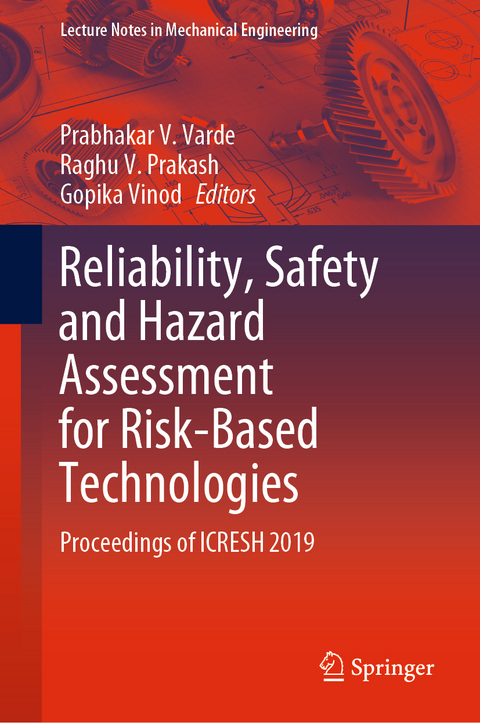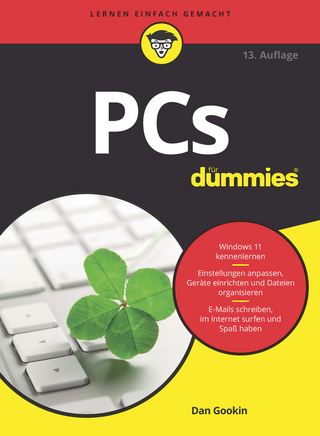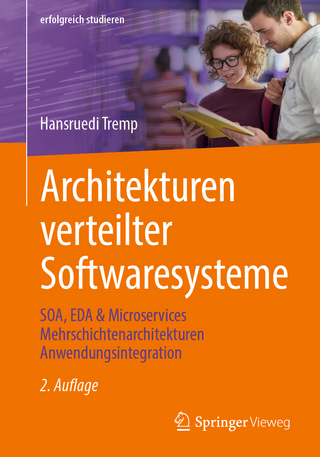
Reliability, Safety and Hazard Assessment for Risk-Based Technologies
Springer Verlag, Singapore
978-981-13-9007-4 (ISBN)
Prof. Prabhakar V. Varde is an expert in the field of application of reliability and probabilistic risk assessment to nuclear plants and is currently working as Head of the Research Reactor Services Division and Senior Professor at Homi Bhabha National Institute, Bhabha Atomic Research Centre, Mumbai, India, where he also serves in advisory and administrative capacities in Atomic Energy Regulatory Board (AERB), India, and the Homi Bhabha National Institute, India. He is the Founder and President of the Society for Reliability and Safety (SRESA) and is one of the chief editors for its international journal—Life Cycle Reliability and Safety Engineering. He completed his B.E. (Mech) from Government Engineering College, Rewa, in 1983 and joined BARC, Mumbai, in 1984, where he worked as a Shift Engineer in the Reactor Operations Division until 1995. In 1996, he received his Ph.D. in Reliability Engineering from the Indian Institute of Technology, Bombay, Mumbai, following which he worked as a Postdoctoral Fellow at the Korea Atomic Energy Research Institute, South Korea, and a Visiting Professor at the Center for Advanced Life Cycle Engineering (CALCE) at the University of Maryland, USA. Professor Varde is also a consultant/specialist/Indian expert for many international organizations, including OECD/NEA (WGRISK), Paris; International Atomic Energy Agency, Vienna; University of Maryland, USA; Korea Atomic Energy Research Institute, South Korea. Based on his R & D work, he has published over 200 publications in journals and conferences, including 11 conference proceedings books. Prof. Raghu V. Prakash is a Professor in the Department of Mechanical Engineering, Indian Institute of Technology Madras (IIT Madras) where he specializes in new product design and the assessment of structural integrity and remaining life prediction of critical components used in transportation and energy sectors. He has more than twenty five years of professional experience in the field of fatigue and fracture and has published more than 100 scientific articles in books and journals, more than 100 conference publications and has edited 4 book volumes. He has developed test systems for use in academia, R&D and industry during his tenure as Technical Director at BiSS Research, Bangalore; at IIT Madras, he teaches courses relating to Fracture Mechanics, Design with Advanced Materials, Product Design, DFMA. He is a voting rights member of ASTM International (Technical Committees, D-30, E-08 and E-28), current Chair of the Materials Processing Technical Committee of the Materials Division of ASME, Chair of Technical committee (Mechanical, Aerospace) of InSIS and Chair of the Chennai Chapter of Society for Failure Analysis. He serves in the Editorial boards of Journal of Structural Longevity, Frattura ed Integrità Strutturale (IGF Journal of Fracture and Structural Integrity), Journal of Life Cycle Reliability and Safety Engineering. Prof Prakashreceived his Bachelor’s degree in Mechanical Engineering from College of Engineering, Guindy, Madras (now Chennai); Master’s degree (by Research) and Ph.D. from the Department of Mechanical Engineering, Indian Institute of Science Bangalore. He is a member of several technical societies (including the Indian Structural Integrity Society, Society for Failure Analysis and Indian Institute of Metals) and has won several prestigious awards (Binani Gold Medal of the Indian Institute of Metals), scholarships and Erasmus-Mundus Fellowships. He is the recipient of Distinguished Fellow of the International Conference on Computational and Experimental Engineering and Sciences (ICCES) 2015. Dr Gopika Vinod is a faculty member and the Head of the Probabilistic Safety Section in Bhabha Atomic Research Centre, Mumbai, India. She received her PhD in Reliability Engineering from Indian Institute of Technology, Bombay, after which she has worked as a post-doctoral fellow at the Steinbies Advanced Risk Technologies, Germany and as a visiting scientist at Brookhaven National Laboratory. She was a recipient of the DAE Young Engineer Award in 2007 and has been actively involved in reliability, safety and risk analysis of Indian nuclear power plants, and nuclear and chemical facilities. She has worked on the development of reliability based operator support systems such as risk monitors and symptom based diagnostic systems for Indian nuclear power plants. Her other areas of research activities include risk informed in-service inspection, reliability of computer based systems, dynamic reliability analysis, human reliability analysis, etc. She is in the editorial board of international Journal of System Assurance Engineering and Management, and the Journal of Life Cycle Reliability and Safety Engineering. She also serves as Journal Referee to IEEE Transactions on Reliability, Reliability Engineering and System Safety, Risk Analysis,Annals of Nuclear Energy, Nuclear Engineering and Design, etc.
Chapter 1: Time Dependent short mode failures in MLCCs due to cracks in the device bodies.- Chapter 2: Local Orbit Bump Control in Indus-2 Using Intelligent Agents Based Control for Enhanced System Operability.- Chapter 3: Reliability Analysis of Smart Pressure Transmitter.- Chapter 4: Accelerated failure time models with corrective and preventive maintenance for repairable systems subject to imperfect repair.- Chapter 5: Reliability Improvement of Single Shot Device.- Chapter 6: Reliability Evaluation of Silicon Carbide (SiC) Boost Converter using Stochastic Model.- Chapter 7: Application of HALT for Standardization in Aerospace Systems: A Case study of Relay Contactors.- Chapter 8: Failure Mode Effect Analysis of Analog Alarm Trip Unit using simulation technique.- Chapter 9: Analytical Modelling of Distributed File Systems (GlusterFS and CephFS).- Chapter 10: Ageing model for electrolytic capacitors under thermal overstress.- Chapter 11: Vulnerability Assessment of Authorization System for USB-based Storage Devices.- Chapter 12: Crypto-Ransomware Detection using Behavioural Analysis.- Chapter 13: Comprehensive Safety Analysis of Station Black Out scenario in TAPS-1 and 2.- Chapter 14: Source-term Prediction during Loss of Coolant Accident in NPP using Artificial Neural Networks.- Chapter 15: Markov probabilistic approach based availability simulation modelling and performance evaluation of coal supply system of thermal power plant.
| Erscheinungsdatum | 06.09.2019 |
|---|---|
| Reihe/Serie | Lecture Notes in Mechanical Engineering |
| Zusatzinfo | 333 Illustrations, color; 127 Illustrations, black and white; XVI, 1015 p. 460 illus., 333 illus. in color. |
| Verlagsort | Singapore |
| Sprache | englisch |
| Maße | 155 x 235 mm |
| Themenwelt | Mathematik / Informatik ► Informatik ► Theorie / Studium |
| Informatik ► Weitere Themen ► Hardware | |
| Naturwissenschaften ► Physik / Astronomie | |
| Technik ► Bauwesen | |
| Technik ► Maschinenbau | |
| Schlagworte | Accident Management • Dynamic Models for Reliability Analysis • failure prediction • Hazard Evaluation Methods • Passive System Reliability • Probabilistic Safety Assessment • Prognostics & Health Management • Reliability Based Design • Reliability prediction • Risk Based Design • Risk-Informed Approach • Safety Critical Issues • Software Reliability |
| ISBN-10 | 981-13-9007-X / 981139007X |
| ISBN-13 | 978-981-13-9007-4 / 9789811390074 |
| Zustand | Neuware |
| Informationen gemäß Produktsicherheitsverordnung (GPSR) | |
| Haben Sie eine Frage zum Produkt? |
aus dem Bereich


